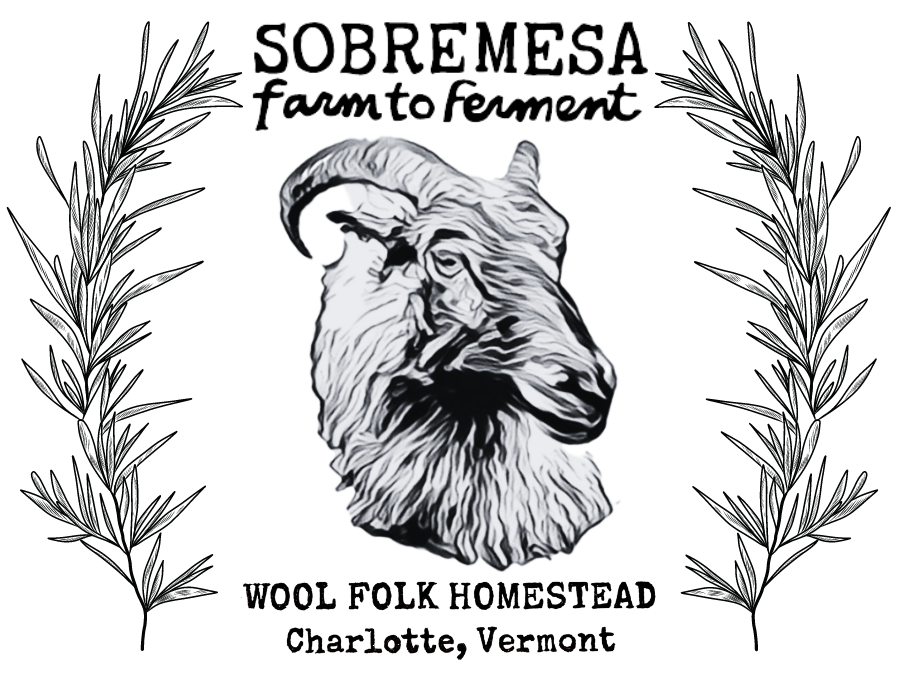“Wild fermentation is a way of incorporating the wild into your body, becoming one with the natural world.”
Caitlin & Jason fermenting with Sandor Katz at Shelburne
Farms, July 2014 Photo Credit Michael Good
FAQ:
1. Does your product need to be stored in the refrigerator after I open it?
We recommend refrigeration upon purchase or receipt, even if you do not plan to eat it right away. Because we do not seal or heat-process our jars to maintain the benefits of raw, fermented vegetables, we recommend putting them in the refrigerator where they will keep for many months.
2. Because they are called "lacto-fermented", do your products contain dairy?
No. The word lacto refers to Lactobicillus, the healthy bacteria present in our naturally fermented vegetables.
3. How long will these keep?
Vegetable fermentation is an ancient method of food preservation. Our products keep for a year or more.
4. "What's normal?"
It is normal for fermented vegetables to fizz, and bubble up open opening. This shows us that the ferments is alive. This is safe to consume.
5. Is there vinegar in them?
No. Our products are traditionally fermented, using sea salt and raw vegetables.
Preparation to ferment dilly beans.
Photo Credit Caitlin Elberson
Excerpted from Wild Fermentation: The Flavor, Nutrition, and Craft of Live-Culture Foods (Chelsea Green, 2003) by Sandor Ellix Katz aka Sandorkraut.
"Wild foods, microbial cultures included, possess a great, unmediated life force, which can help us adapt to shifting conditions and lower our susceptibility to disease. These microorganisms are everywhere, and the techniques for fermenting with them are simple and flexible.
Wild fermentation involves creating conditions in which naturally occurring organisms thrive and proliferate. Fermentation can be low-tech. These are ancient rituals that humans have been performing for many generations. They are a powerful connection to the magic of the natural world, and to our ancestors, whose clever observations enable us to enjoy the benefits of these transformations.
By eating a variety of live fermented foods, you promote diversity among microbial cultures in your body. Biodiversity, increasingly recognized as critical to the survival of larger-scale ecosystems, is just as important at the micro level. Call it microbiodiversity. Your body is an ecosystem that can function most effectively when populated by diverse species of microorganisms. By fermenting foods and drinks with wild microorganisms present in your home environment, you become more interconnected with the life forces of the world around you. Your environment becomes you, as you invite the microbial populations you share the earth with to enter your diet and your intestinal ecology.
Wild fermentation is the opposite of homogenization and uniformity, a small antidote you can undertake in your home, using the extremely localized populations of microbial cultures present there, to produce your own unique fermented foods. What you ferment with the organisms around you is a manifestation of your specific environment, and it will always be a little different. Do-it-yourself fermentation departs from the realm of the uniform commodity. Rediscover and reinterpret the vast array of fermentation techniques used by our ancestors. Build your body’s cultural ecology as you engage and honor the life forces all around you.
The prized cultures of a San Francisco sourdough, or the finest Bleu cheese, have their roots in wild fermentations that took place in someone’s kitchen or farmhouse long ago. Who knows what compelling healing flavors could be floating around in your kitchen?"
Curry Turmeric Kraut on a Wild Rhythms Farm Lamb sandwich
Photo Credit Caitlin Elberson



